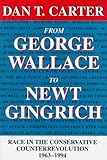From George Wallace to Newt Gingrich : race in the conservative counterrevolution, 1963-1994 / Dan T. Carter.
Material type: TextSeries: The Walter Lynwood Fleming lectures in southern historyPublication details: Baton Rouge : Louisiana State University Press, c1996.Description: xv, 134 p. ; 24 cmISBN:
TextSeries: The Walter Lynwood Fleming lectures in southern historyPublication details: Baton Rouge : Louisiana State University Press, c1996.Description: xv, 134 p. ; 24 cmISBN: - 0807121185 (cloth : alk. paper)
- 9780807121184 (cloth : alk. paper)
- 305.8/00973
- 002 E 185.625 C323f 1996
| Item type | Current library | Home library | Collection | Shelving location | Call number | Vol info | Copy number | Status | Date due | Barcode |
|---|---|---|---|---|---|---|---|---|---|---|
 Libro
Libro
|
Biblioteca Juan Bosch | Biblioteca Juan Bosch | Recursos Regionales | Recursos Regionales (2do. Piso) | 002 E 185.625 C323f 1996 (Browse shelf(Opens below)) | 1 | 1 | Available | 00000079494 |
Includes bibliographical references and index.
1. The Politics of Anger -- 2. The Politics of Accommodation -- 3. The Politics of Symbols -- 4. The Politics of Righteousness.
In this trenchant survey of the last three decades, the historian Dan Carter focuses on the evolution of race as an issue in presidential politics. Drawing on his broad knowledge of recent political history, he traces the "counterrevolutionary" response to the civil rights movement since George Wallace's emergence on the national scene in 1963 and detects a gradual confluence of racial and economic conservatism in the coalition that reshaped American politics from the.
1970s through the mid-1990s. According to Carter, economic and social conservatives have denied any link between what neoconservatives have called the "new majoritarianism" and the politics of race, and Republicans have eschewed acknowledging Wallace as an influence, much less as a model. But the fundamental differences between the coarse public rhetoric of the Alabama governor and the smoother arguments of the new conservatism, Carter maintains, have been more a matter.
of style than of substance: in Richard Nixon's subtle manipulation of the busing issue, in Ronald Reagan's genial, avuncular attacks on affirmative action, in George Bush's use of the Willie Horton ads, and in Newt Gingrich's demonization of welfare mothers, the Wallace music played on. The new rhetoric may lack Wallace's visceral edge, Carter asserts, but it reflects the same callous political exploitation - now professionally packaged and test-marketed - of the raw.
wounds of racial division in our country.


There are no comments on this title.